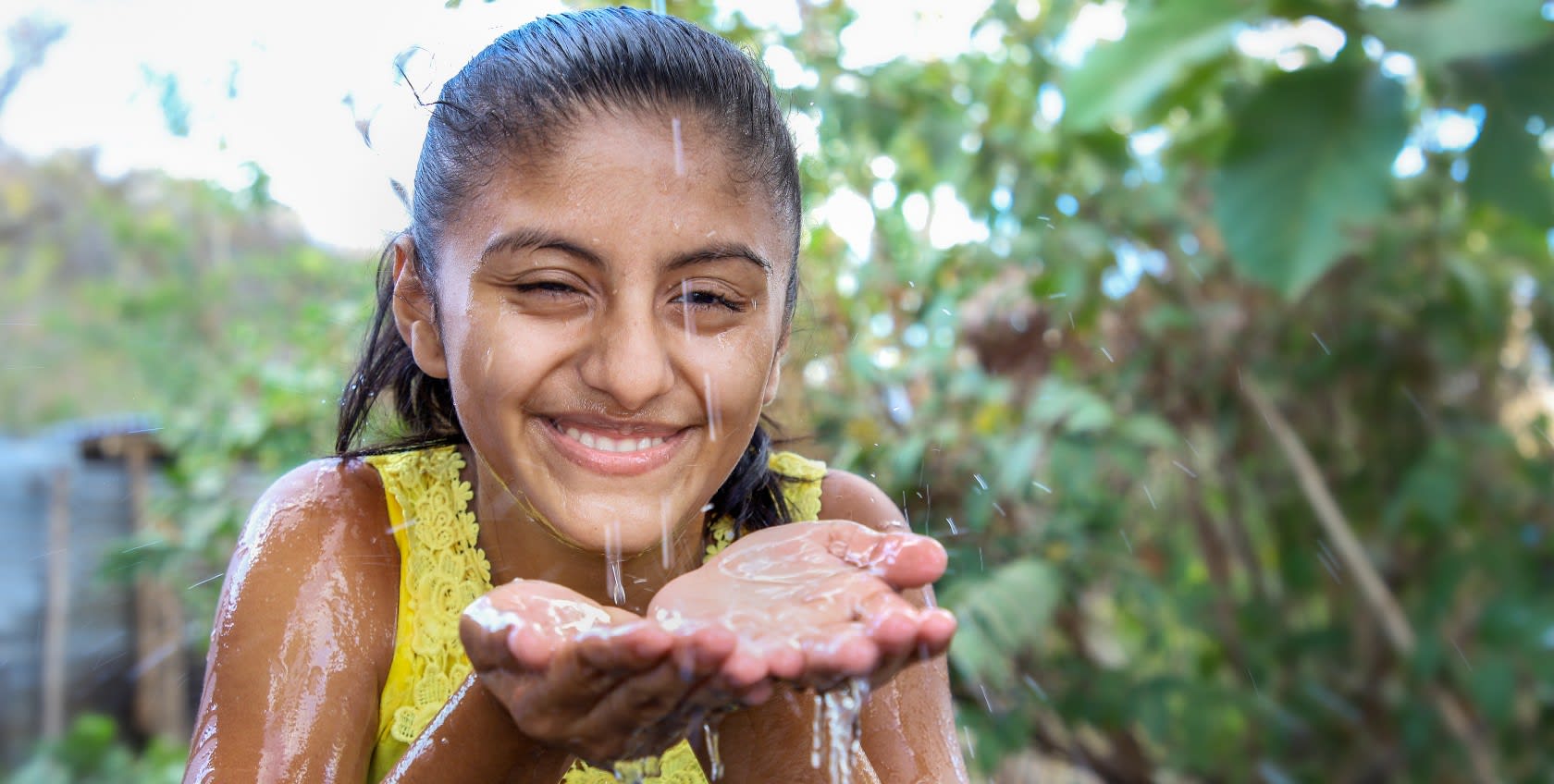
This project will help: 1,980 children and their families
Estimated completion date: April 2026
Country: El Salvador
Executive summary
Over the last 50 years, El Salvador has endured widespread and long-term damage to its bodies of water. A recent study conducted by the José Simeón Cañas Central American University (UCA) found that the demand for clean water in El Salvador grew by more than 15 per cent from 2012 to 2022, while the availability of safe drinking water decreased by 2.5 per cent. Currently, most Salvadorans get water from the Lempa River; however, studies indicate that due to changing climate patterns, the river’s flow could decrease by up to 50 per cent by the end of the century.
Children and families from nine Compassion centres in El Salvador live in areas with limited access to safe water and are struggling to find clean water to use for drinking and household tasks. In these communities, some must wait to purchase water from trucks, while others have running water in their homes but only for one to two hours per day. Sadly, the water they do receive is often not safe for consumption. Families do not have reliable access to water to clean their dishes, bathe, prepare and cook food or wash their clothes. Compassion centres have also had to purchase water for their programs, taking up much of their budgets that could have gone directly to programming.
In addition, women are disproportionately impacted by limited access to water. In rural communities, 80.5 per cent of water collection is done by women. Similarly, 69 per cent of water collection is done by women in urban communities. Most families living in poverty cannot afford to purchase water bottles and end up fetching water from any source they can find, which can lead to waterborne illnesses like cholera, hepatitis and diarrhea.
To address these challenges, in this intervention Compassion will work with nine frontline church partners to bring clean water to their communities. With your generous support, cisterns with filters will be installed at nine Compassion centres in El Salvador. Cisterns will also be installed at the homes of 90 highly vulnerable families. In addition, water filters will be distributed to 1,800 families. All 1,800 children and 180 caregivers will also attend educational workshops on hygiene and the safe use of water.
Summary
Background
In the last few decades, water scarcity has become an increasing challenge across El Salvador, especially for communities in the “dry corridor”—a strip of land that spans El Salvador, Guatemala, Honduras and Nicaragua that experiences long periods of drought. Since 2013, Compassion El Salvador has implemented interventions focused on access to water through the distribution of filters, cisterns for collecting water and, more recently, building wells in communities located in the dry corridor. These interventions also include an educational component, helping families improve their hygiene habits and preventing hygiene-related diseases.
These interventions have proved highly successful in improving access to safe water and sanitation practices among children, families and communities. Building on this success, Compassion wants to implement the same approach at the ES0833, ES0856, ES0859, ES0860, ES0862, ES0914, ES0935, ES0020 and ES0920 centres in El Salvador.
The need
In El Salvador, many families struggle to access clean, safe water to use for drinking and daily household activities. In nine communities where Compassion’s frontline church partners serve, growing children have limited access to water and sanitation—impacting their physical development, nutrition, overall health and their self-esteem. But with your generous gift, 1,980 children and their families and centre staff will have access to clean water through the distribution of water filters and the installation of cisterns at nine Compassion centres. In addition, cisterns will also be installed at the households of 90 vulnerable families.
Cisterns help improve clean water access by collecting and storing rainwater. Filters clean collected rainwater, making it safe for drinking, cooking and other household activities. With access to water filters and cisterns, families will have consistent access to water without having to rely on distant or contaminated sources. Your generous support will also allow these participants to attend water and sanitation workshops led by local health workers, where they will learn how to properly use their filters, safely store water and prevent hygiene-related diseases. Compassion centres will also benefit as they will have ready access to clean water for program days and freeing up funds to go directly into programming for children and youth.
What your gift will do
Your generous support will help a total of 1,980 children and caregivers as well as centre staff in El Salvador access clean water through the installation of cisterns and water filters, including:
- 90 cisterns for families
- 9 cisterns for Compassion centres
- Transportation of water tanks to 9 Compassion centres
- Cistern installation
- Water filters for 1,800 families and 9 Compassion centres
- Monitoring and follow-up
Logistics
- Local contribution: US$2,925
- Handling of funds: Compassion El Salvador will work with centre and church leadership to ensure this project stays within budget.
- Monitoring and follow-up: Centre staff will prepare the sites where the cisterns will be installed and pay skilled labourers after installation. They will also monitor the implementation of this intervention and conduct interviews with children and caregivers at the end of the program.
